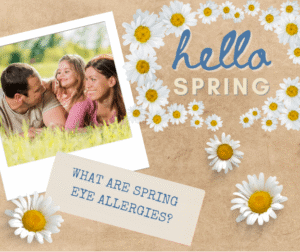Posted by: Kentucky Eye Institute in General Eye Health
 With the arrival of spring, we are entering allergy season, which can cause congestion, headaches, and itchy eyes but also marks new beginnings. Eye allergies, also known as allergic conjunctivitis, are a common condition, according to the American Academy of Ophthalmology. You are not alone in this. They occur when the eyes react to an allergen, a shared experience for many during spring. Knowing that you’re part of a larger community dealing with this can provide a sense of comfort and understanding. Unlike other kinds of conjunctivitis, eye allergies do not spread from person to person. Patients with Spring eye allergies commonly have nasal allergies, an itchy, stuffy nose, and sneezing. Importantly, this is typically a short-term condition linked with seasonal allergies, offering hope for relief and the promise of a symptom-free period. This hopeful outlook can help you navigate the challenges of allergy season with a positive mindset. Eye allergies can be caused by various factors such as pet dander, dust, pollen, smoke, perfumes, and even certain foods. If you cannot avoid the cause, your eye allergies may become more severe, resulting in significant burning, itching, and increased sensitivity to light for your eyes.
With the arrival of spring, we are entering allergy season, which can cause congestion, headaches, and itchy eyes but also marks new beginnings. Eye allergies, also known as allergic conjunctivitis, are a common condition, according to the American Academy of Ophthalmology. You are not alone in this. They occur when the eyes react to an allergen, a shared experience for many during spring. Knowing that you’re part of a larger community dealing with this can provide a sense of comfort and understanding. Unlike other kinds of conjunctivitis, eye allergies do not spread from person to person. Patients with Spring eye allergies commonly have nasal allergies, an itchy, stuffy nose, and sneezing. Importantly, this is typically a short-term condition linked with seasonal allergies, offering hope for relief and the promise of a symptom-free period. This hopeful outlook can help you navigate the challenges of allergy season with a positive mindset. Eye allergies can be caused by various factors such as pet dander, dust, pollen, smoke, perfumes, and even certain foods. If you cannot avoid the cause, your eye allergies may become more severe, resulting in significant burning, itching, and increased sensitivity to light for your eyes.What Are the Symptoms of Eye Allergies?
The most common eye allergy symptoms include:- red, swollen, or itchy eyes
- burning or tearing of the eyes
- sensitivity to light
What Causes Eye Allergies?
An allergy is when the body’s immune system reacts to an ordinarily harmless allergen. When an allergen comes in contact with your eye, specific cells within your eye (called mast cells) release histamine and other substances to fight off the allergen. This reaction causes your eyes to become red, itchy, and watery.What Are Eye Allergy Triggers?
- Outdoor allergens, such as pollen from grass, trees, and ragweed
- Indoor allergens, such as dust mites, pet dander, and mold
- Irritants, such as cigarette smoke, perfume
Spring Eye Allergy Management
Avoid triggers by making changes to your home and your routine.- Keep windows closed during high pollen periods; use air conditioning in your home and car.
- Wear sunglasses outdoors to keep pollen out of your eyes.
- Wash your hands and face frequently.
Overcome Springtime Eye Allergies and Experience a Joyful Spring!
References: American Academy of Ophthalmology and American Optometric Association. This blog provides information and discussion about eye health and related subjects. The content provided in this blog and any linked materials are not intended and should not be considered medical advice. If the reader or any other person has a medical concern, they should consult with an appropriately licensed physician.

